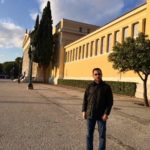The Armchair Philosophers are the wonderful people who answer your questions. Though diverse in many respects, they are united by their love for and postgraduate degrees in philosophy.
If you have a question for the Armchair Philosophers, don’t hesitate to get in touch. You can find us on X (formerly Twitter) @armchair_o or fill in this form.
If you like what we do, you can support us by buying us a coffee!
I teach philosophy at St. Louis Community College, Meramec. I have an associate's, bachelor's, master's, and doctoral degree in philosophy. I love thinking about knowledge (the field called "epistemology") and ethics (especially taking interest in convincing people to do the right thing for the right reason). My heroes include Socrates and Kant.
I am an expert on the human condition. I did an MPhil in Philosophy at KCL. My PhD at Oxford is on the significance of Hume’s philosophy of law. The core idea is that law's ultimate point is reducible to the interests of society. I run a coaching business called The Philosophical Coach. I host the podcast, 'This Humean Life', which tackles the nuances of being human – exploring how thoughts and language create our reality and why identity is never as fixed as we assume, and covering topics such as mental health, failure, relationships, masculinity, joy, business.
I am a PhD candidate in Political and Social Thought at the University of Kent, Canterbury. I am researching modern Western cosmologies and approaches to organicism. My interests lie in the area of continental political thought, process ontologies and the philosophy of technology. My favourite philosophers are A.N. Whitehead and F.W.J. Schelling, whom I admire for their organic systematizations of nature and natural knowledge.
I did an MEng in Civil Engineering at Cardiff University and an MA in Philosophy at the University of Warwick. I spent some time studying Nietzsche and the history of philosophy, but since then I have focused mostly on the philosophy of mind and philosophy of emotions. One of the most recent ideas I have found interesting (and crazy for our standards) is the revision of panpsychism (coming in varieties like protopanpsychism). This is the view that mental properties may ultimately be fundamental like physical properties. If this is right, then it may be that in the future, psychophysical laws are going to explain the conscious experiences associated with the physical processes explained by physical laws.
I did a BA in Philosophy at the University of Bologna, followed by an MA, MPhilStud and PhD at Birkbeck, University of London. I currently work at Birkbeck and King’s College as a teaching assistant, delivering seminars to CertHE, BA and MA students. My areas of expertise are political philosophy, ethics and gender. I am also interested in business ethics, ethics of science and technology, applied ethics and politics, and the history of political thought. My research focusses on liberal multiculturalism, autonomy and vulnerability. I am fascinated by the idea of freedom, its history, and its recent developments in political theory.
I have studied philosophy since 2010 at Adam Mickiewicz University in Poznań (I do not like moving). Currently, I am trying really hard to finish my Ph.D. thesis concerning the concept of the technical object in contemporary continental philosophy. I mostly work in the field of philosophy of technology, poststructuralism, critical theory, and posthumanism. Personally, I am a big fan of relational ontologies. I believe that the "essence" of things is only a consequence of their relations to other entities. I haven't published much in English, but check my Academia profile or contact me if you are interested in my research.
I did a BSc in International Politics and then an MA in Continental Philosophy. My main influence is Nietzsche, who mentions that in order to properly understand not only humanity, but also the world we live in, we have to engage in the “naturalisation of humanity” and the “de-deification of nature.” Understanding this is crucial if we want to find better and more realistic ways of living alongside one another.
I studied in Geneva and Paris (University of Geneva and École Normale Supérieure) and I specialized in the philosophy of emotions, especially in the relationship between affective states and memory. My master's thesis dealt with nostalgia and represented an attempt to establish a general philosophical theory of this rich and complex emotion. Other areas of interest include moral emotions, metaethics and metaphysics, with a penchant for fictionality. I do not have any specific philosophical arguments in mind; however, I find that the works of Russell, Popper and Kripke are a must-read.
I think I began studying philosophy seriously in 1987 when Optimus Prime died seemingly for nothing at the hands of Megatron. Twenty years later I finally earned a Master’s degree, but I never did work out whether it was Hot Rod’s fault for intervening in the fight or Optimus Prime’s for not taking the shot when he had the chance. Consequently, these days I am quite the cocktail purist. The one real regret in my life is that I once saw someone order a gin martini on the rocks and I did absolutely nothing to stop it.
Having studied philosophy at both undergraduate and postgraduate level at the University of London, Birkbeck College, I am now an employee of the Erasmus School of Philosophy, Rotterdam, where I work as both a teacher and junior researcher in philosophy. Currently I’m engaged in a NWO funded project in social choice theory, looking specifically at personal preference and resource depletion. I see philosophy as an interconnected whole and so I tend to read widely. I also think – like many of my colleagues – that philosophy is sorely absent from much of public discourse. But, then again, I would say that…









